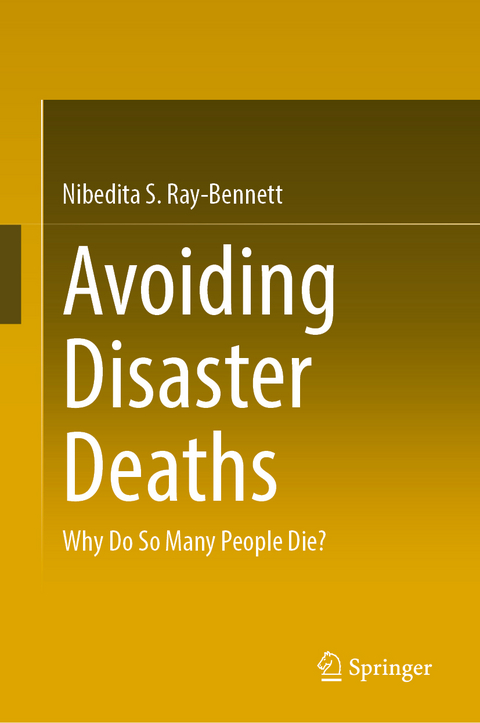
Avoiding Disaster Deaths
Springer International Publishing (Verlag)
978-3-031-81299-6 (ISBN)
- Noch nicht erschienen - erscheint am 13.02.2025
- Versandkostenfrei
- Auch auf Rechnung
- Artikel merken
This book introduces a pathbreaking approach called 'Avoidable Disaster Deaths' (ADD) to reduce disaster deaths.
Disaster deaths are the direct and indirect impact of hazards. The 'Sendai Framework for Disaster Risk Reduction' has urged the United Nations Member States to reduce disaster deaths or mortality by 2030. Reducing the number of disaster deaths has become a useful marker for improving disaster risk management. Equally important is knowing how people die, who dies, why they die, and which disaster deaths are 'avoidable' and 'unavoidable'. Disaster risk reduction specialists have not fully examined these questions.
Built from disaster risk reduction, public health, epidemiology, human geography, risk and crisis management studies, the ADD approach disaggregates disaster deaths into avoidable and unavoidable. Avoidable disaster deaths are preventable, amenable and governance-related. Unavoidable deaths are those that occur annually due to natural causes or poverty-related diseases. In a disaster climate, the emphasis should be on reducing avoidable disaster deaths in a resource-constrained context.
Using the context of COVID-19 and the economic lockdown in India, the analytical advantage of this approach is explored. Doing so, the book brings forth human stories whose lives were cut short and introduces novel matrices and dynamic strategies to ascertain the 'cause and circumstances' of avoidable disaster deaths to develop the capacity of disaster and health responders.
The book is suitable for students, academics, policy-makers and practitioners interested in disaster risk reduction, human rights, risk and crisis management, environmental science, human geography, Sustainable Development and Sendai Goals.
The book is also suitable for passionate citizens who want to capture the number, causes and circumstances of avoidable disaster deaths and take positive action to save lives in their communities.
Professor Nibedita S. Ray-Bennett is a social scientist specialising in disaster risk reduction and international development at the interface with public health.
She is the founding president of the Avoidable Deaths Network (ADN), a founding governing board member and interim associate director of the Institute for Environmental Futures at the University of Leicester. Nibedita is a global expert at the International Science Council.
She launched the flexible learning MSc Risk, Crisis, and Disaster Management in 2020. In 2023, she launched the ADN's global campaign, 'International Awareness Day for Avoidable Deaths' (IAD4AD), with her research partner, Dr Hideyuki Shiroshita.
Chapter 1. What is a Disaster?.- Chapter 2. What Leads to Disaster Disasters?.- Chapter 3. How Can Disaster Deaths be Reduced?.- Chapter 4. Unavoidable Deaths in India.- Chapter 5. Governance for COVID-19 in India.- Chapter 6. Avoidable Disaster Deaths in India.- Chapter 7. Avoidable Disaster Deaths Approach Revisited.- Index.
| Erscheint lt. Verlag | 13.2.2025 |
|---|---|
| Zusatzinfo | Approx. 200 p. |
| Verlagsort | Cham |
| Sprache | englisch |
| Maße | 155 x 235 mm |
| Themenwelt | Naturwissenschaften ► Biologie ► Ökologie / Naturschutz |
| Naturwissenschaften ► Geowissenschaften | |
| Schlagworte | Avoidable Disaster Deaths' (ADD) • Avoidable Disaster Deaths’ (ADD) • Biological disaster (COVID-19) • Causes and circumstances of avoidable disaster deaths • Communication, Coordination, Collaboration • Disaster risk governance • disaster risk reduction • Epidemiology, human geography, risk & crisis management studies • Sendai Framework for Disaster Risk Reduction' • Sendai Framework for Disaster Risk Reduction’ • Substantially reduce disaster mortality by 2030 • Unavoidable deaths |
| ISBN-10 | 3-031-81299-9 / 3031812999 |
| ISBN-13 | 978-3-031-81299-6 / 9783031812996 |
| Zustand | Neuware |
| Haben Sie eine Frage zum Produkt? |
aus dem Bereich


